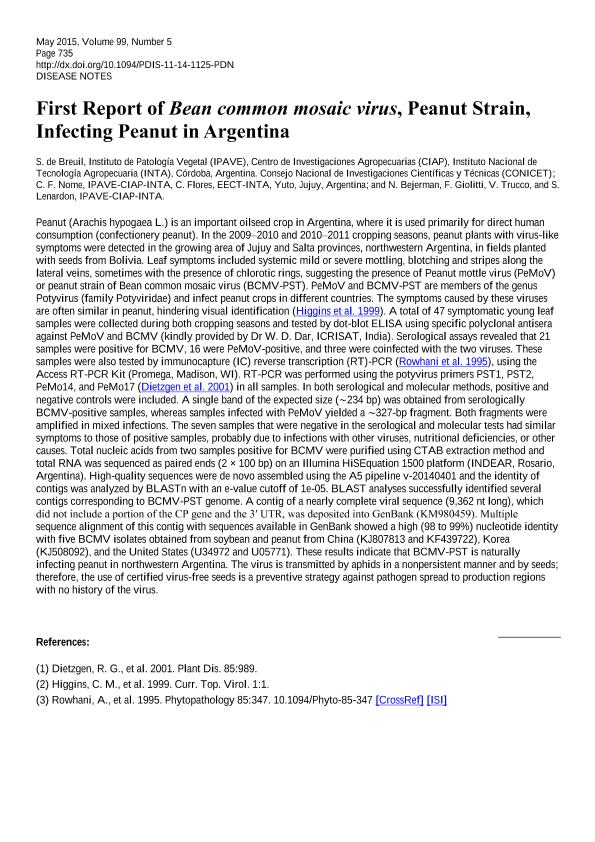Artículo
First report of bean common mosaic virus, peanut strain, infecting peanut in Argentina
de Breuil, Soledad ; Nome, Claudia; Flores, C.; Bejerman, Nicolas
; Nome, Claudia; Flores, C.; Bejerman, Nicolas ; Giolitti, Fabián José; Trucco, Verónica Milagros; Lenardon, S.
; Giolitti, Fabián José; Trucco, Verónica Milagros; Lenardon, S.
 ; Nome, Claudia; Flores, C.; Bejerman, Nicolas
; Nome, Claudia; Flores, C.; Bejerman, Nicolas ; Giolitti, Fabián José; Trucco, Verónica Milagros; Lenardon, S.
; Giolitti, Fabián José; Trucco, Verónica Milagros; Lenardon, S.
Fecha de publicación:
05/2015
Editorial:
American Phytopathological Society
Revista:
Plant Disease
ISSN:
0191-2917
Idioma:
Inglés
Tipo de recurso:
Artículo publicado
Clasificación temática:
Resumen
Peanut (Arachis hypogaea L.) is an important oilseed crop in Argentina, where it is used primarily for direct human consumption (confectionery peanut). In the 2009/2010 and 2010/2011 cropping seasons, peanut plants with virus-like symptoms were detected in the growing area of Jujuy and Salta provinces, northwestern Argentina, in fields planted with seeds from Bolivia. Leaf symptoms included systemic mild or severe mottling, blotching and stripes along the lateral veins, sometimes with the presence of chlorotic rings, suggesting the presence of Peanut mottle virus (PeMoV) or peanut strain of Bean common mosaic virus (BCMV-PST). PeMoV and BCMV-PST are members of the genus Potyvirus (family Potyviridae) and infect peanut crops in different countries. The symptoms caused by these viruses are often similar in peanut, hindering visual identification (Higgins et al. 1999). A total of 47 symptomatic young leaf samples were collected during both cropping seasons and tested by dot-blot ELISA using specific polyclonal antisera against PeMoV and BCMV (kindly provided by Dr W. D. Dar, ICRISAT, India). Serological assays revealed that 21 samples were positive for BCMV, 16 were PeMoV-positive, and three were coinfected with the two viruses. These samples were also tested by immunocapture (IC) reverse transcription (RT)-PCR (Rowhani et al. 1995), using the Access RT-PCR Kit (Promega, Madison, WI). RT-PCR was performed using the potyvirus primers PST1, PST2, PeMo14, and PeMo17 (Dietzgen et al. 2001) in all samples. In both serological and molecular methods, positive and negative controls were included. A single band of the expected size (ca. 234 bp) was obtained from serologically BCMV-positive samples, whereas samples infected with PeMoV yielded a ca.327-bp fragment. Both fragments were amplified in mixed infections. The seven samples that were negative in the serological and molecular tests had similar symptoms to those of positive samples, probably due to infections with other viruses, nutritional deficiencies, or other causes. Total nucleic acids from two samples positive for BCMV were purified using CTAB extraction method and total RNA was sequenced as paired ends (2 × 100 bp) on an Illumina HiSEquation 1500 platform (INDEAR, Rosario, Argentina). High-quality sequences were de novo assembled using the A5 pipeline v-20140401 and the identity of contigs was analyzed by BLASTn with an e-value cutoff of 1e-05. BLAST analyses successfully identified several contigs corresponding to BCMV-PST genome. A contig of a nearly complete viral sequence (9,362 nt long), which did not include a portion of the CP gene and the 39 UTR, was deposited into GenBank (KM980459). Multiple sequence alignment of this contig with sequences available in GenBank showed a high (98 to 99%) nucleotide identity with five BCMV isolates obtained from soybean and peanut from China (KJ807813 and KF439722), Korea (KJ508092), and the United States(U34972 and U05771). These results indicate that BCMV-PST is naturally infecting peanut in northwestern Argentina. The virus is transmitted by aphids in a nonpersistent manner and by seeds; therefore, the use of certified virusfree seeds is a preventive strategy against pathogen spread to production regions with no history of the virus.
Palabras clave:
POTYVIRUS
,
MOLECULAR IDENTIFICATION
,
PEANUT
Archivos asociados
Licencia
Identificadores
Colecciones
Articulos(CCT - CORDOBA)
Articulos de CTRO.CIENTIFICO TECNOL.CONICET - CORDOBA
Articulos de CTRO.CIENTIFICO TECNOL.CONICET - CORDOBA
Citación
de Breuil, Soledad; Nome, Claudia; Flores, C.; Bejerman, Nicolas; Giolitti, Fabián José; et al.; First report of bean common mosaic virus, peanut strain, infecting peanut in Argentina; American Phytopathological Society; Plant Disease; 99; 5; 5-2015; 735-735
Compartir
Altmétricas



